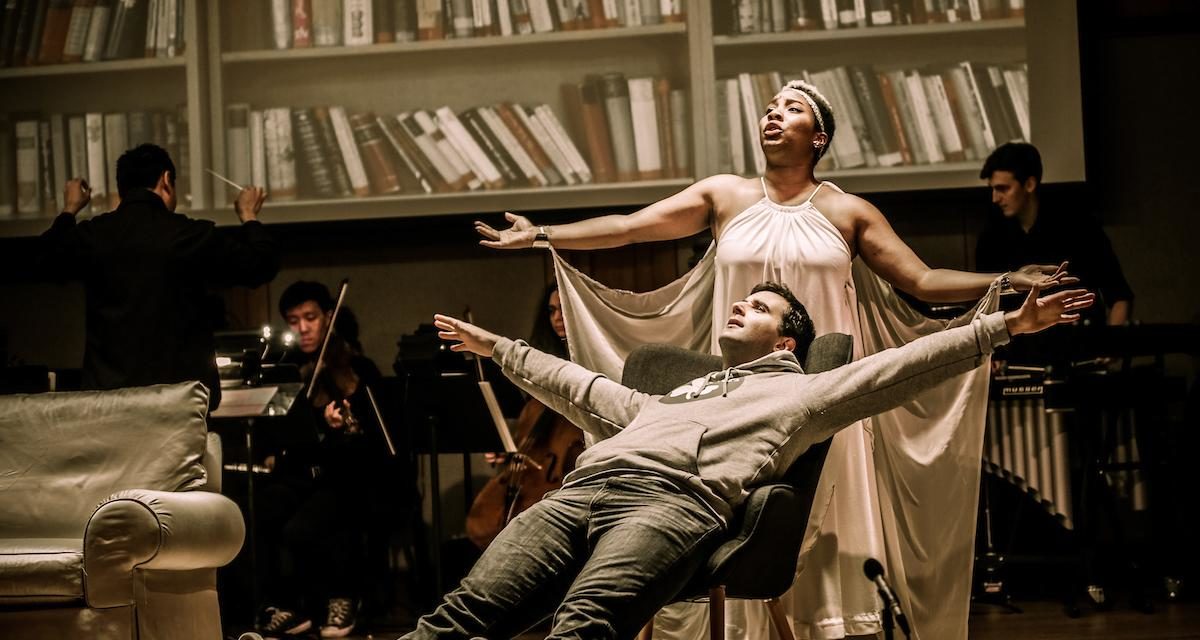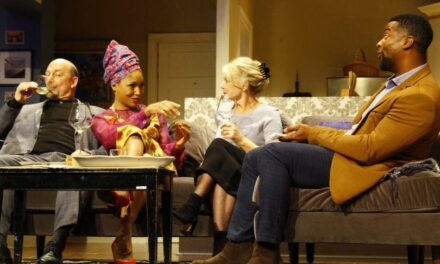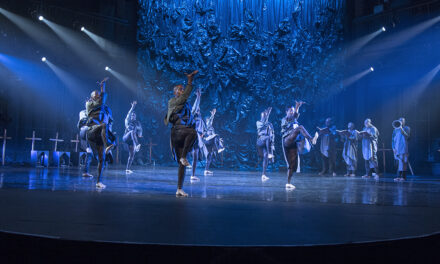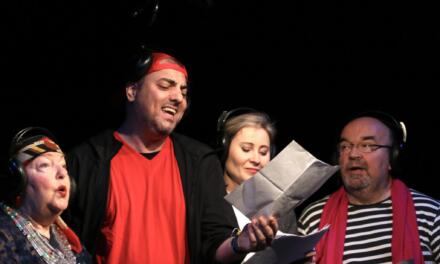Delightfully thought-provoking and fun, the Boston Opera Collaborative’s third annual festival of short operas was a delicious program celebrating life’s sweetest and sometimes most sour moments with cleverness and heart. Partnering with Longy School of Music and the welcome addition of The Boston New Music Initiative, BOC served seven bite-sized contemporary operas at Longy’s Pickman Hall in Cambridge. The intimate space paired with cabaret-style seating and hors-d’oeuvres and wine garnered a warm atmosphere on a cold Saturday night. The tasteful event was only surpassed by the night’s entertainment itself. The snappy selection of short-form pieces was very palatable to the viewer. From a love triangle amongst goddesses and mortals to a fetus’ existential crisis in utero, each “bite” had a different flavor.
Our first course was Oliver Caplan and Anne Ray’s Symposium, a witty dramatization of an awkward social interaction at a business seminar. Fusing spoken dialogue with a contemporary classical spirit, this piece asks questions such as “Why am I a machine?” and “Am I alone?” while entertaining the anxieties surrounding even the banalest conversations with the opposite sex. We follow three women, presumably the three faces of April as she attempts to talk to a man in her seminar, lamenting her inability to do so in three-part harmony. While the vocal blend between the three women was not always seamless and the distinction between April’s three dimensions a touch unclear, the three still started the program with a performance that popped.
Notably the most somber of the selections, Carrie Magin and Kendall A’s Voice On The Wire explores one woman’s commitment to her husband’s invention–the telephone–in the face of her own deafness. Despite the aid of expository title cards, the story proved too dense to fully capture the conflict within and between its two characters. The division into multiple scenes jumping in time interrupted the flow of the piece, suggesting that perhaps the scope was too ambitious for an opera of this size. Rebecca Krouner shone as Mabel Bell, a powerful presence with a vulnerable tessitura that shaped each phrase with care. Overall, the piece both ironically and appropriately used music to depict the ways in which “voices can be felt if not heard.”
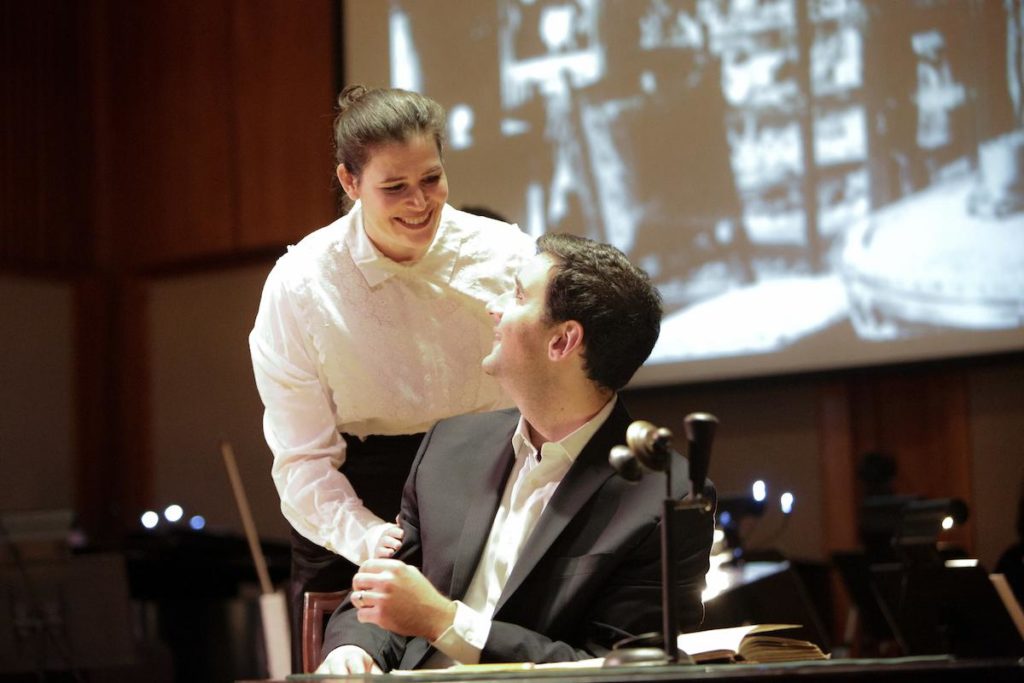
Voice On The Wire. Photo Credit: Dan Busler
The festival was privileged to include many world premieres, the first of which was Eva Kendrick’s Wish You Were Here, based on the play of the same name by Claudia Haas. This opera follows an encounter between two strangers-turned-soulmates who entertain a fantasy of starting a life together under the intoxicating glow of Paris by night. Rife luscious jazz influences, Kendrick’s score envelops the listener with intriguing harmonies that transport us to La Ville-Lumière along with Adrienne Boris’ attentive stage direction. The well-meaning Frenchman remarks,
“Mademoiselle, it’s been a pleasure sharing a lifetime with you,” and it was a pleasure witnessing it through Carley DeFranco and Scott Ballantine’s charismatic performances as Ashley and Jean-Louis.
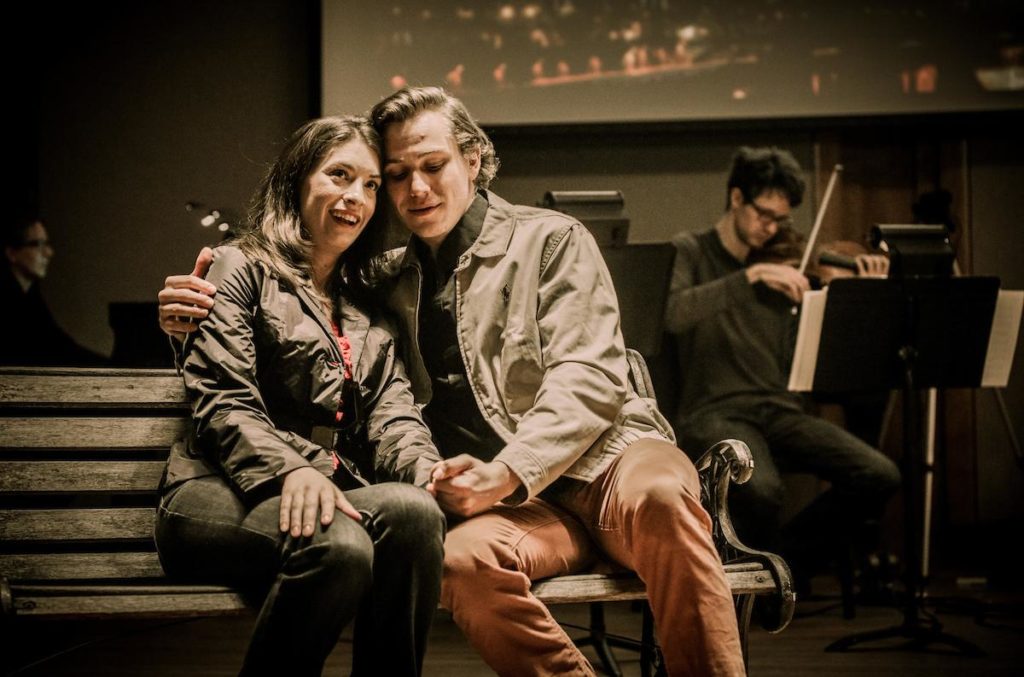
Wish You Were Here. Photo Credit: Dan Busler
Delightfully executed with sidesplitting hilarity, Tony Solitro’s Triangle, based on Jane Martin’s play, was a standout favorite. There are three points to every love triangle–but what happens when one of those points is Aphrodite herself? Solitro’s score is amusingly intricate, fraught with tension, and certainly showcased the talented instrumental ensemble–featuring Daniel Lewis on the triangle for humorous effect. Yet Triangle owed its electric energy to Celeste Godin as Joyce and Sirgourney Tanner as The Other Woman. Godin brought the neurotic, proverbial “woman scorned” to life, committing to every comedic moment with zesty precision. Tanner showed fantastic range, deftly transitioning from an operatic passagio to a sultry mix, scooping with musical prowess and full command of the stage.
The second set of performances opened with David Wolfson’s Rapture, following a devout mother and her doubtful daughter as they await deliverance before the end of the world. A powerful look at navigating the disappointment of living another day on earth, this piece was a departure from the lighter fare while still exploring a provocative concept. Jenny Searles Margulies carried the show as the pious mother, though her dark, bold strokes often overpowered Stephanie Hollenberg’s lighter, more vulnerable ones.

Rapture. Photo Credit: Dan Busler
Our next course, Tom Cipullo’s Lucy was a charming yet profound snapshot of the titular elderly woman (Shannon Grace) as she is visited by a strange Young Man only she can see (Junhan Choi). Grace captured the physicality of her character with attentive dexterity, her floating soprano an effortless delicacy paired well with Choi’s rich timbre. Cipullo’s score was lush, fruitfully condensed in a solo piano beautifully performed by Music Director Chelsea Whitaker that invoked the silent films of old. Greg Smucker’s masterful stage direction transported us to the monochrome world of Lucy’s isolation, brought to life in full technicolor at the arrival of the Young Man. While it was unclear whether this man was indeed Death come to claim her, this opera took a heavy topic and made it agreeable to the viewer.
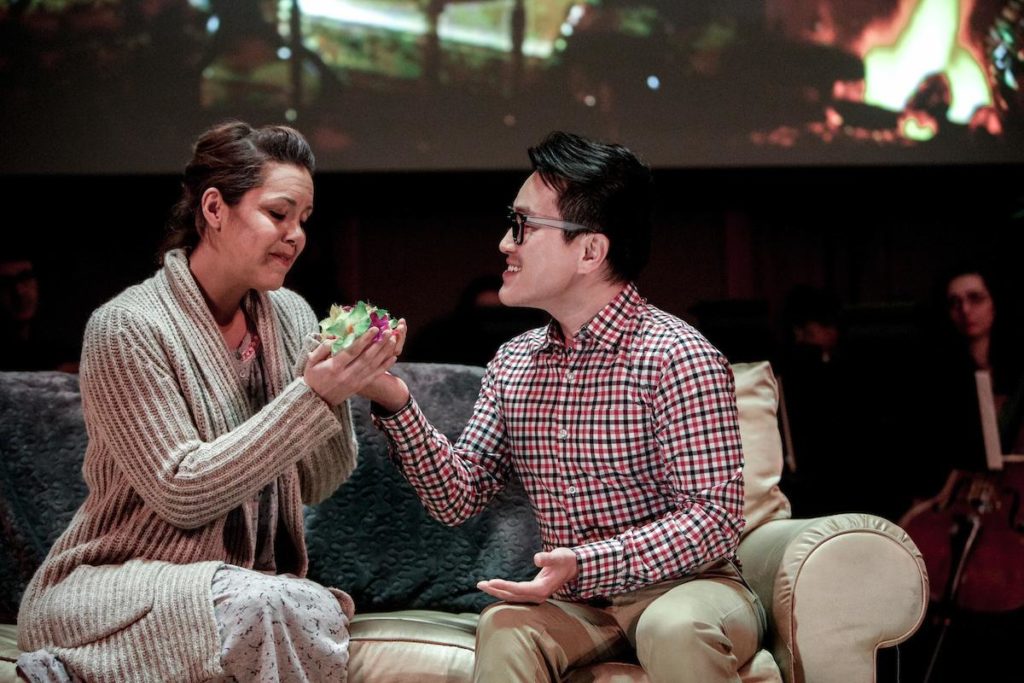
Lucy. Photo Credit: Dan Busler
The final item on the menu was the delectable and sharp-witted Womb With A View with music by Beth Ratay and libretto by Rich Orloff, another world premiere. As humanity’s manufacturers administer the final checks on a newborn on another celestial plane before she is released into the world, the new kid (Natalie Logan) is reluctant to suffer life with the new soul she has acquired. Although a touch heavy-handed at times, Womb With A View simultaneously sprinkled the soul as glitter and begged the soul’s most agonizing questions such as “Is love worth the pain?” Remarkably funny yet endlessly insightful–this opera had bite.
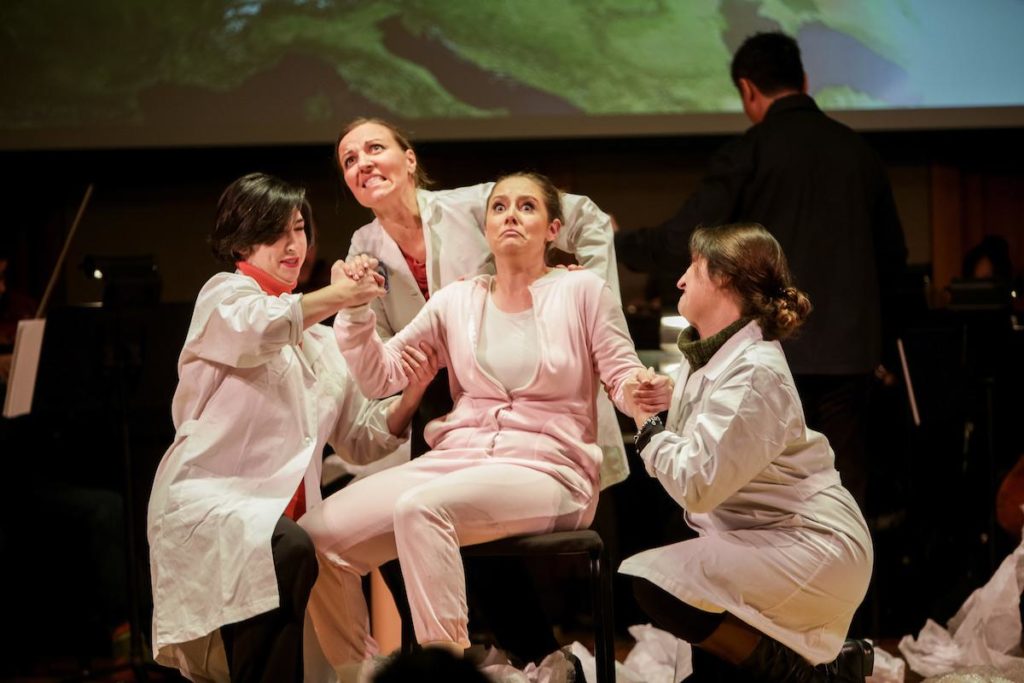
Womb With A View. Photo Credit: Dan Busler
Boston Opera Collaborative struck gold again with this refined selection of short and sweet works. Each opera introduced a new tonal language and narrative style, a welcome palette cleanser for opera lovers and those wary of the historically lengthy genre alike. With highlights such as Wish You Were Here, Triangle, and Lucy, every piece was performed with dynamic vigor and care. With no two alike, each opera complemented the other wonderfully, leaving a pleasant aftertaste long after the feast was over.
This post was written by the author in their personal capacity.The opinions expressed in this article are the author’s own and do not reflect the view of The Theatre Times, their staff or collaborators.
This post was written by Kristin Tomecek.
The views expressed here belong to the author and do not necessarily reflect our views and opinions.

